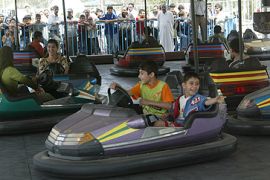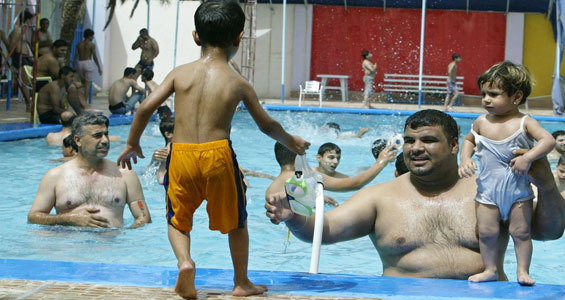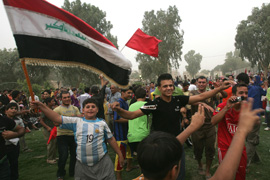Baghdad ‘returning to normal’
Cautiously optimistic about improved security, Iraqis resume leisurely activities.

 |
| Improved security has allowed pools to re-open for families escaping the heat [GALLO/GETTY] |
It was late Thursday afternoon when my friend Amal called to talk about our weekend plans. For the past several months, we had grown accustomed to ‘hanging out’ at the bustling shopping centres in my neighbourhood, the Al-Saydiyah district in southwest Baghdad.
But just three years ago, violence and a lack of security in Baghdad and the rest of the country would have made such leisurely activities impossible.
People were unable to leave their homes except to buy food and seek emergency medical attention; the number of government-imposed curfews meant it was unsafe to even cross the street to a pharmacy.
Life was particularly difficult for women who were intimidated by militia groups into wearing long sleeves and head scarves. Men avoided wearing the latest fashions fearing attacks by over-zealous armed groups.
Between 2006 and 2007, Al-Saydiyah turned into a ghost-town as the once-famous shopping district in my neighbourhood shut down.
Despite the kidnappings, executions and bomb attacks it was the summer heat and lack of electricity which proved to be our deadliest enemies.
We were barely able to provide blocks of ice to keep drinking water cold through blazing summer days.
During the night, we escaped the heat by sleeping on the roof of the house but even that came to an abrupt halt when the sound of bullets and shooting would wake us up and we would frantically hurry downstairs carrying our mattress and pillows.
But as security improved in the past year-and-a-half, many residents of Baghdad began to emerge from the darkness, aware that they had survived the violence which nearly tore their capital apart.
My once-volatile neighbourhood is now flourishing slowly day by day with police forces deployed everywhere, inspiring a sense of security and relief.
Illuminating the darkness
The solar-powered street lights in central Baghdad flicker on shortly after sunset, illuminating the darkness that once brought fear to the capital.
These days, sundown is a time to celebrate. Cars jam Karrada Street in central Baghdad as fashionable young Iraqi men and women cruise the streets.
Families burst into clothing shops in the Mansour, Al-Adhamiyah, Baya’a, and Jama’a neighbourhoods, which were once the battlefields between different armed groups.
Tea houses and restaurants now host parties and wedding receptions. Liberal-minded youth seek out a handful of nightclubs and bars scattered around the city.
As security has improved and curfews have eased, Baghdad’s once-famous nightlife has slowly re-emerged. It is now a symbol of normal times returning to a city long brutalised by war and still tormented by bombings.
The capital’s residents have adopted carpe diem as their daily motto, in contrast to the violence of 2006-2007, when according to one resident “people locked their doors at 4pm and huddled at home”.
Abu Nawas Park has been rebuilt and is undergoing renovation and refurbishment. With its flora and colourful benches, it offers Iraqis a pleasant venue to socialise despite the soaring temperatures of summer.
Fast food popularity
Fast food restaurants and snack canteens can now be found throughout Baghdad. One such restaurant is Crispy, which provides western dishes in Al-Wathiq Square. It is usually very crowded throughout the night and has been one of the favourite spots for my friends and I to frequent.
Nightclubs, which were closed in 1994 when Saddam Hussein, the deposed president, tried to woo Islamist support after the first Gulf War, have recently re-opened and are once again holding parties that last well into the pre-dawn hours.
The customers do not seem to care how much money they spend at these establishments, believing the chance to relax and unwind is well worth the cost.
One such place called Bayarat Al-Sham in the Al-Jadriyah district south of Baghdad has been particularly popular in recent months; it was nearly destroyed in the early years of the war but has now been completely remodelled.
Cautious optimism
 |
| Many Iraqis celebrated the US withdrawal from their cities [GALLO/GETYY] |
But Iraqis cannot help looking over their shoulders every once in a while. Going out at night carries a sense of optimism as well as apprehension, particularly following the recent upsurge in violence.
A bomb targeting civilians just a few weeks ago killed several people including students who had just finished their final exams and were returning home from Sadr City.
However, the violence has not stalled the constant procession of patrons to restaurants, nightclubs or liquor stores. In the past few decades, through war and strife, Iraqis developed a unique characteristic, learning how to live in heaven and hell simultaneously.
Young Iraqi men and women have also developed new ways to approach the opposite sex. When I was walking home the other day, I saw a young man giving what appeared to be his business card to a young girl.
But it wasn’t a business card at all – young Iraqi men have started printing cards with their names and contact details which they then hand over to the young ladies who have caught their fancy.
Suddenly, a gust of air blew the card out of the young man’s hand leaving him embarrassed as people stopped and stared. I considered this to be a healthy indication that life was slowly returning to normal in Baghdad.
Surviving the worst
For the most part, many Iraqis believe that Baghdad has survived the worst and are cautiously optimistic about the US withdrawal from the country’s urban centres.
Noor Hasan, a 20-year-old medical student, believes that the US military withdrawal is “just a first step toward a better future”.
Her father, an engineer in the ministry of industry, urges patience.
“We can’t get everything at once. People are belittling this [withdrawal] step on the pretext that Americans are still there in the suburbs, but I believe that they are going to leave the country completely when the right moment comes.”
But some believe US forces will always play a central role Iraq.
“They crossed hundreds of thousands of miles, and lost many of their soldiers to occupy Iraq. That withdrawal is only a show, something on paper, and will never materialise into something real,” Nadia Abdulraheem, an employee in a health club, told me on June 30 as the US troops began to withdraw from Iraqi cities.
Shopping!
I met Amal ten minutes after she called and spent the next three hours going from boutique to boutique trying on the latest imported fashions.
After an exhaustive shopping spree, we decided to take a short break and headed to one of the many cafeterias dotting the Al-Saydiyah district – she had a fruit cocktail and I opted for some ice cream.
By the time I decided to return home, the streets were quickly filling with shoppers and families looking for a cool escape from the summer heat.
Faiza Ali is the pseudonym of a young writer who requested that her real name not be used for fear of repercussions. She is a graduate from the department of linguistics at Baghdad University.
The above views are the author’s own and do not necessarily reflect those of
Al Jazeera.